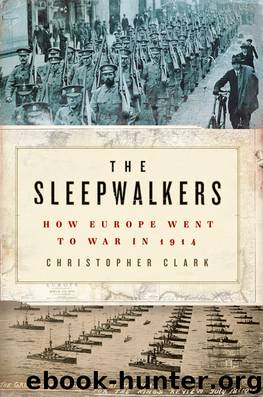The Sleepwalkers: How Europe Went to War in 1914 by Christopher Clark

Author:Christopher Clark
Language: eng
Format: mobi, epub
Tags: World War I, History
ISBN: 9780061146657
Publisher: Allen Lane
Published: 2012-09-26T23:00:00+00:00
Ivan Goremykin
It was difficult, in other words, to imagine a scenario in which the Russians would be able to secure the necessary international backing for a policy aimed directly and openly at securing control of the Straits. This was the problem Charykov had faced in November 1911, when he had explored the possibility of a bilateral deal with the Porte. At that time, Sazonov had opted to disavow his ambassador in Constantinople, because he believed a direct bid for the Straits was still premature. He had gravitated instead towards Hartwig, whose militant pan-Slavist policy was focused on the Balkan peninsula, and on Serbia in particular. The logic of that choice suggested that the failure or frustration of a Straits policy was likely to shift the emphasis back again to the Balkan salient. This was in some ways a default or residual option. But a forward policy in the Balkans did not by any means entail the abandonment of Russia’s ultimate interest in the Straits. On the contrary, it represented a longer and more winding road to the same destination. Russian strategic thinking tended increasingly in 1912–14 to view the Balkans as the hinterland to the Straits, as the key to securing ultimate control of the Ottoman choke-point on the Bosphorus.129 Underlying this conviction was the belief, increasingly central to Sazonov’s thinking during the last years before the outbreak of war, that Russia’s claim to the Straits would only ever be realized in the context of a general European war, a war that Russia would fight with the ultimate aim of securing control of the Bosphorus and the Dardanelles.130
These concerns were reflected in the protocols of the state Special Conference of 8 February 1914. Convened and chaired by Sazonov and marked by a distinctly post-Kokovtsovian disinhibition in tone and outlook, the conference reaffirmed the importance of Russian control of the Straits. And yet, as Sazonov acknowledged, it was hard to imagine how the Straits could be taken without triggering a ‘general European war’. The discussion thus turned on how Russia should prioritize two quite different tasks: the seizure of the Dardanelles and the winning of a European war that would itself require the commitment of all available forces. Responding to Sazonov’s remarks, Chief of Staff Zhilinsky noted that in the event of a European war, Russia would not be able to spare the troops required for a seizure of the Straits – these would be needed on Russia’s western front. But – and this was the important conceptual step – if Russia prevailed in the war on the western front, the question of the Dardanelles would also solve itself, along with various other regional issues, as part of the larger conflict. Quartermaster-General Danilov agreed. He was against any military operation directed exclusively at securing the Straits:
The war on the western front would demand the ultimate exertion of all forces of the state; we would not be able to dispense with even one Army Corps in order to keep it aside for other tasks.
Download
The Sleepwalkers: How Europe Went to War in 1914 by Christopher Clark.epub
This site does not store any files on its server. We only index and link to content provided by other sites. Please contact the content providers to delete copyright contents if any and email us, we'll remove relevant links or contents immediately.
| Africa | Americas |
| Arctic & Antarctica | Asia |
| Australia & Oceania | Europe |
| Middle East | Russia |
| United States | World |
| Ancient Civilizations | Military |
| Historical Study & Educational Resources |
The Radium Girls by Kate Moore(12017)
100 Deadly Skills by Clint Emerson(4920)
Rise and Kill First by Ronen Bergman(4779)
The Templars by Dan Jones(4682)
The Doomsday Machine by Daniel Ellsberg(4484)
The Rape of Nanking by Iris Chang(4203)
Killing England by Bill O'Reilly(3995)
Stalin by Stephen Kotkin(3957)
Hitler in Los Angeles by Steven J. Ross(3942)
12 Strong by Doug Stanton(3541)
Hitler's Monsters by Eric Kurlander(3328)
Blood and Sand by Alex Von Tunzelmann(3194)
The Code Book by Simon Singh(3177)
Darkest Hour by Anthony McCarten(3119)
The Art of War Visualized by Jessica Hagy(3000)
Hitler's Flying Saucers: A Guide to German Flying Discs of the Second World War by Stevens Henry(2744)
Babylon's Ark by Lawrence Anthony(2671)
The Second World Wars by Victor Davis Hanson(2521)
Tobruk by Peter Fitzsimons(2507)
